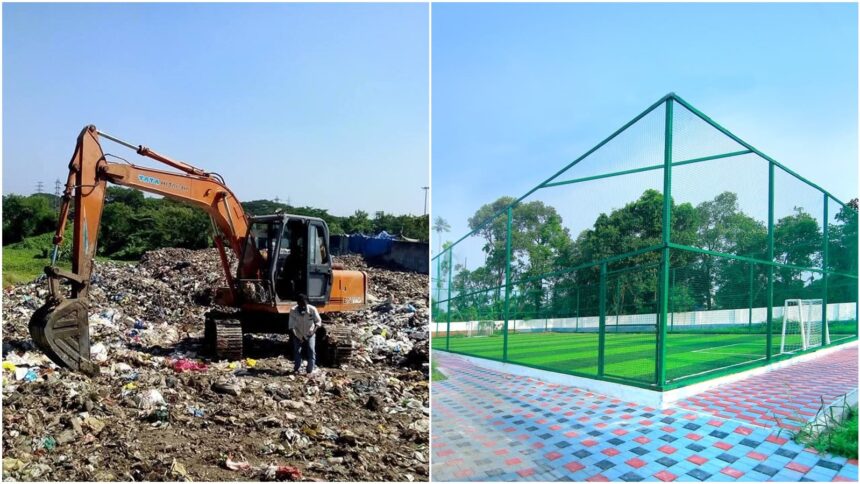Until 2015, the landfill site in Kuzhikkandam in Kerala’s municipal town of Eloor was the place where the town dumped its waste. Teeming with mounds and mounds of perishables, paper and plastic, the landfill’s putrid stench that hung in the air for kilometres. Today, the dump yard has turned into a newly-built football turf — complete with lush green lawns, paved pathways and gleaming green grills – all thanks to the local civic body’s scientific and decentralised waste management.
Undertaken under the state government’s Ambedkar Village Development Programme for the integrated development of Dalit settlements, the new football ground was thrown open to the public Monday. Significantly, the site is close to a Dalit settlement.
While inaugurating the ground, Industries Minister P Rajeeve, the (Marxist) legislator from Kalamassery assembly constituency under which the town falls, said there were many who raised doubts about whether a dumping yard can be turned into a playground. The landfill — measuring 0.49 acres — was closed in 2015 following protests from locals.
“When the local body closed down the yard (in 2015), many continued to dump their waste there in breach of decision. The municipality took action against it, even as it rolled out many steps for scientific waste management. Now, Eloor municipality has become a role model in waste management,” the minister said.
According to the minister, the state government chipped in Rs 40 lakh for the football turf while the CPI(M)-ruled municipality paid Rs 20 lakh.
“Over a decade back, local CPI(M) leaders, including me, had led agitations against dumping of the waste near the Dalit settlement,” municipal chairperson A D Sujil told . “In 2015, the municipal council decided to close the garbage yard and we launched the Clean Eloor project, which led to a makeover of the municipality.”
According to officials, following the 2015 closure of the landfill, the local body set up aerobic compost bins in various parts of the town as part of its ‘Clean Eloor’ project. The civic body’s initiative to engage women to collect plastic waste from houses later eventually evolved into one of Kerala’s flagship programmes – the Haritha Karma Sena, a force of women employed by a local body for collection of non-degradable domestic waste, Sujit says.
In 2018, Eloor became among the first municipal bodies to launch the Haritha Karma Sena.
According to Sujil, the idea of converting the garbage yard into a football ground came after P Rajeeve became legislator in 2021. “Legacy waste in the yard was segregated into degradable and non-degradable and taken out. Members of Haritha Karma Sena collected all types of non-biodegradable waste from 12,000-odd houses in the municipality. The sena covers around 99 percent of households in the municipality. For processing biodegradable waste, the municipality has biocomposite bins in houses and public places as well,” he said, adding that it was after this that work on the football field began.
Still talking about Haritha Karma Sena, Sujitv said the civic body currently has 32 women as members of the body. “A member of the Sena earns at least Rs 21,000 from the user fee collected from households and the sale of non-biodegradable waste, including plastic, glassware and e-waste, collected from households. These women, mainly from BPL families, also get a bonus from the consortium,” he said.
Last week, a team of officials from the Goa State Livelihood Mission visited Eloor to study the functioning of the Haritha Karma Sena.








